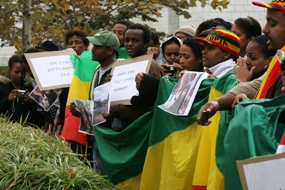Protestors at US State Department call foul on Ogaden
By Daniel Van Oudenaren
October 26, 2008 (WASHINGTON) — More than 100 Ethiopians rallied Friday at the U.S. State Department, protesting U.S. support for Ethiopia’s government and alleging human rights violations against civilians and systematic repression of ethnic Somalis in the Ogaden region of Ethiopia.
 Human rights advocates allege that potential famine-like conditions in parts of Ethiopia could be aggravated by counter-insurgency tactics in the Ogaden and intentional constraints on humanitarian aid.
Human rights advocates allege that potential famine-like conditions in parts of Ethiopia could be aggravated by counter-insurgency tactics in the Ogaden and intentional constraints on humanitarian aid.
Famine Early Warning System (FEWS) reported Thursday that “food security in parts of southeastern and northern Ethiopia will deteriorate from already high or extreme levels if forecasts indicating trends toward below-normal October-December/January rains hold.”
The rally organizers handed a letter addressed to Secretary of State Condoleezza Rice to John Wysham, head of the Ethiopia desk at the State Department. The letter urges the U.S. to hold Ethiopia accountable for its “widespread and gross violation of human rights against thousands of innocent civilians in the Ogaden region of Ethiopia as in other places of Ethiopia,” according to the rally’s organizers.
Neamin Zeleke, a spokesman for the protestors, said that they encourage the U.S. to send a fact-finding mission to the region to investigate alleged widespread and systematic human rights violations by the security forces of the regime, identify those who are directly involved, and ensure that they receive no assistance or training from the United States, as required by U.S. law.
The organizers referred to the so-called “Leahy law,” which are provisions in the U.S. code that prohibit defense appropriations and training to military units involved in gross human rights violations.
During the protest on Friday, Fitsum Achamyeleh Alemu, a Virginia-based attorney and human rights activist, accused the government of Ethiopia of gross human rights violations, basing his statement on reports from the U.S. State Department, Human Rights Watch and Amnesty International.
Alemu claimed that the government intentionally restricted access to water, food and grazing areas, confiscated livestock and trade goods, and obstructed humanitarian assistance in the Ogaden region.
In conclusion, Alemu asked the US government to take leadership to stop the violence. He asked for a new, independent commission to investigate the human rights situation in every province of Ethiopia.
Guled Kassim, a human rights activist in the Washington, D.C. area who is originally from Ogaden, demanded that U.S. taxpayer money not be funneled to dictators like Meles Zenawi. Guled lead chants of “bread, not bullets for the people of Ogaden!”
Responding to questions at an event in Washington on Oct. 20, the Ethiopian Minister of Health Tedros Adhanom said, “I think with the drought at the moment we have around 6.4 million people affected … one of the health-related problems is malnutrition. We are trying to address that.”
Adhanom added that Ethiopia’s more than 24,000 health extension workers could have a role to play in coping with the crisis.
Ethiopia requested USD $265 million in food assistance from donors for Sept.-Dec. 2008. Some 76 percent of emergency beneficiaries are in Somali, Oromia and South Ethiopia People states, according to the state-run Ethiopian News Agency.
(ST)
